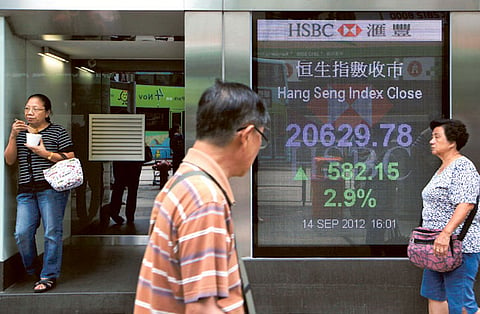Most Asian stock gain outside Japan and China gain
China shares retreat on QE3

Sydney: Most Asian stocks outside Japan and China rose, led by mining companies, amid speculation U.S. stimulus measures will boost global demand. Shares in Shanghai and Hong Kong retreated as Citigroup Inc. cut its 2013 growth outlook for China.
BHP Billiton Ltd., the world’s largest mining company, climbed 2.5 per cent in Sydney as rising metals prices boosted raw-material companies. An index of Hong Kong property companies slipped after the city introduced measures to counter price gains caused by Federal Reserve easing. Some Chinese car sellers dropped as anti-Japan protests turned violent over the weekend.
The MSCI Asia Pacific Excluding Japan Index climbed 0.2 percent to 442.41 as of 6:46 p.m. in Hong Kong, headed for its highest closing level since May 2. Chinese shares fell as Citigroup cut its 2013 economic forecast for the country on weaker external demand. Equity markets in Japan are closed for a public holiday.
“Over the longer term we’re still optimistic,” Steve Brice, Singapore-based chief investment strategist at Standard Chartered Plc, said on Bloomberg Television. “Equity markets are the best asset class out there at the moment. But we do believe we’re a little bit over-extended in the short term.”
The Asian benchmark rose 12 per cent this year through September 14, compared with a 17 per cent gain on the S&P 500 and a 13 per cent advance for the Stoxx Europe 600 Index amid speculation central banks around the world will step up measures to promote economic growth. The Asian benchmark trades at 12.5 times estimated earnings, compared with 14.2 for the S&P 500 and 12.3 for the Stoxx Europe 600 Index.
Materials and energy producers led gains among Asia-Pacific shares today. The Asia-Pacific excluding Japan Materials Index has risen seven of the past eight days.
Australia’s S&P/ASX 200 Index climbed 0.3 per cent. The Kospi index slipped 0.3 per cent in Seoul today as Samsung Electronics Co., South Korea’s biggest company by market value, fell 1.6 per cent after a judge ruled Apple Inc. didn’t violate Samsung’s patent rights.
The Shanghai Composite Index dropped 2.1 per cent while a measure of Chinese stocks listed in Hong Kong retreated 0.5 per cent. Hong Kong’s Hang Seng Index rose 0.1 per cent after falling as much as 0.2 percent.
“We think Fed’s action could aversely impact China’s bias to ease, at the margin,” Citigroup Global Markets Asia-Pacific Chief Economist Johanna Chua wrote in a report dated today. “We think this has marginally reduced the odds of easing for a number of countries largely due to rising inflation expectations, especially among central banks that have been somewhat neutral to hawkish.”
China Resources Land Ltd., a state-controlled developer, slumped 3.4 percent to HK$17, while Shimao Property Holdings Ltd., a developer that gets all its revenue from China, retreated 2.4 per cent to HK$13.12.
The Hong Kong Monetary Authority said on September 14 that the maximum term on all new mortgages cannot exceed 30 years and also ruled that mortgage payments for investment properties can’t be more than 40 percent of buyers’ monthly incomes.
“It’s irresponsible to the US, and also irresponsible to us,” Liu Mingkang, former chairman of the China Banking Regulatory Commission, told Bloomberg News at a conference in Beijing on September 15. He declined to elaborate. The measures are more likely to boost growth “for a period” of time than provide longer-term support, Yan Qingmin, assistant chairman of the CBRC, said September 15.
BHP Billiton rose 2.5 percent to A$34.15. Rio Tinto Group gained 1.6 per cent to A$57.50.
The London Metals Exchange of industrial metals gained 4.3 per cent on September 14. That was the biggest one-day advance since November 30, when China began loosening monetary policy with its first reduction in banks’ reserve ratio requirements since 2008. The Thomson Reuters/Jefferies CRB Index of raw materials climbed 1.1 percent.
Heightened Tensions
Dongfeng Motor Group Ltd. slid 7 per cent to HK$9.62. Guangzhou Automobile Group Co., the Chinese partner of Toyota Motor Corp. and Honda Motor Co., lost 4.6 per cent to HK$5.46 on concern the carmaker will suffer as China boycotts Japanese cars. A joint venture with Toyota and Honda accounts for the majority of Guangzhou Auto’s total sales, Liang Yonghuo, an analyst at Haitong International Securities Group Ltd., wrote in a note.
Tensions between China and Japan escalated over the weekend. Japanese Prime Minister Yoshihiko Noda’s government said last week it would purchase disputed islands from their private Japanese owner, prompting China to dispatch government vessels near the islands.
Futures on the Standard & Poor’s 500 Index fell 0.1 per cent today. The benchmark for US equities ended last week at the highest level since December 31, 2007.
Sign up for the Daily Briefing
Get the latest news and updates straight to your inbox


